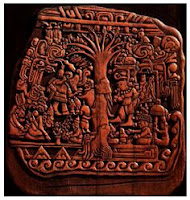23 And it came to pass that there arose a amist of darkness; yea, even
an exceedingly great mist of darkness, insomuch that they who had commenced in
the path did lose their way, that they wandered off and were blost.
-mist of
darkness = confusion, veil, influence of untruths, lack of clarity/vision.
"...arose a mist of darkness..."
-what are
the small things (this mist)?
-TV -thoughts -caffeinated sodas
-"R" rated movies -posters or books -not reading scriptures
-interesting
that this darkness came after the people had gotten out of “the world” and were
diligently trying to live truth.
-(1/31/96) Answers to the following questions about the
mists of darkness could substantially aid our understanding:
1.
Where does the mist come from?
Without
specifically answering the question “where from?”, (since I don’t know if there
is a definite answer or if it is really important) we can safely say that it
affects the people as they travel along the path or are in the field. Hence, it is an element that effects us while
on earth in our mortal experience. What
could it be then?
-TV
influence -foul language -contemporary attitudes
-thoughts -posters, books -“R” rated movies
-or
it could be something along very different lines: it could be a veil that separates us from
God. (“the” veil or the barriers we set up when we sin).
2. What is the nature (the physical properties)
of the mist?
First
of all, the mist is impenetrable.
Second,
it is non-discriminatory, it does not “pick on” some more than others
Thirdly,
it is curious to recognize that the Lord decided to symbolize with a mist
instead of a violent whirlwind or sleet or hail. Similarly he did not use a brick wall as the
object for this principle he wanted to explain.
Mist is a very gentle, light, small substance -implying that the barrier/resistance
symbolized here are things that are almost imperceptible; they are “the small” or “little” things that
will blind us and take us off course. Although
we should also realize that the mist does not knock or take us off the
path -it is simply a passive
obstacle. We leave the path n our own
accord.
“… they who had
commenced in the path…”

-the
devil always sets up his kingdom in direct opposition to the kingdom of God.
He wants to hide the goal (the tree and what
it represents) from our sight.
Just
because it is no longer in our view does not mean it is not there.
The principle of “object permanence” has
spiritual as well as temporal application.
In fact, God has already provided for this lack of visual guidance by
providing
the iron rod.
We are not meant to navigate this life by
physical sight alone.
The eyes, as a physical
sensory input, are easily manipulated and corrupted.
They are heavily influenced by and biased
toward the physical.
We do not see the
Spirit.
Even the privilidged prophets
who have had great theophanies have not seen the Spirit, they may have seen God
but even these FEEL the Spirit.
It
should not be a surpise that the sure way through this mist of darkness is by
feeling the rod of iron and not –due to the mist of darkness- by visual
orientation to the tree of life.
a way that we can feel our way (even if we cannot “see” our way) towards
the goal:
-Just
having the gospel is not enough. We not
only walk the path, we have to be anxiously engaged in living and holding tight
to the gospel.
The difference between verses 23 and 24 or “those who
wandered off” and those who “partake of the fruit” is in their level of
commitment or how they hold to the gospel:
clinging.
-there is a sense of urgency here. What if those who were lost in the mist had
commenced earlier? Perhaps they would
have made the iron rod before the mist arose and would not have been lost.
-those
who became lost after they, at first, began correctly did so primarily because
of the mist. The confusion, lack of
understanding prohibited their continuance.
“lose their
way”
-everyone
has “lost their way” at least once in this life. It happens in an unfamiliar environment or by
carelessness. If we knew how to get to a
destination we would not get lost:
knowledge is very important! As
Jacob later says, “how great the importance to make these things known to the
inhabitants of the earth” (2 Nephi 2:8).
-they
were not rebelling or purposely planning to go astray but because they happened
to lose their way they were lost:
compare to the parables of the sheep, coin and prodigal (Luke 15).







